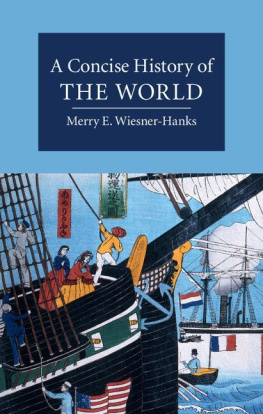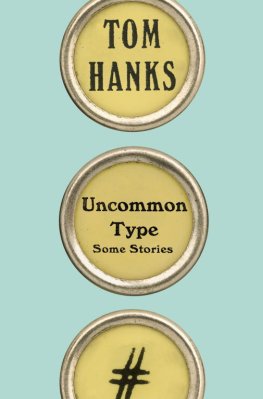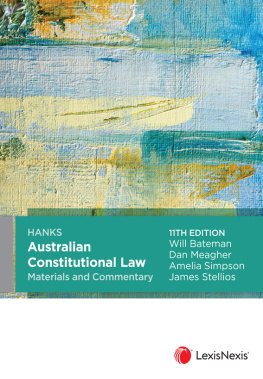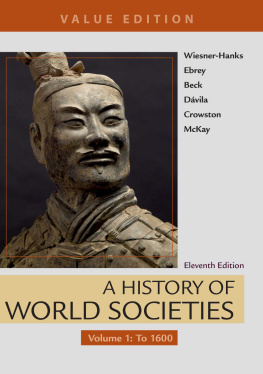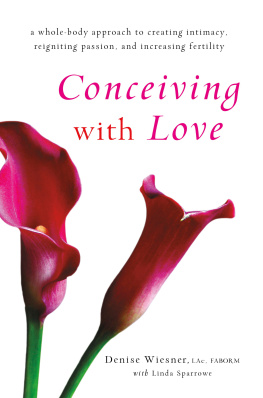Merry E. Wiesner-Hanks - A Concise History of the World
Here you can read online Merry E. Wiesner-Hanks - A Concise History of the World full text of the book (entire story) in english for free. Download pdf and epub, get meaning, cover and reviews about this ebook. year: 2015, publisher: Cambridge University Press, genre: Romance novel. Description of the work, (preface) as well as reviews are available. Best literature library LitArk.com created for fans of good reading and offers a wide selection of genres:
Romance novel
Science fiction
Adventure
Detective
Science
History
Home and family
Prose
Art
Politics
Computer
Non-fiction
Religion
Business
Children
Humor
Choose a favorite category and find really read worthwhile books. Enjoy immersion in the world of imagination, feel the emotions of the characters or learn something new for yourself, make an fascinating discovery.
- Book:A Concise History of the World
- Author:
- Publisher:Cambridge University Press
- Genre:
- Year:2015
- Rating:3 / 5
- Favourites:Add to favourites
- Your mark:
- 60
- 1
- 2
- 3
- 4
- 5
A Concise History of the World: summary, description and annotation
We offer to read an annotation, description, summary or preface (depends on what the author of the book "A Concise History of the World" wrote himself). If you haven't found the necessary information about the book — write in the comments, we will try to find it.
A Concise History of the World — read online for free the complete book (whole text) full work
Below is the text of the book, divided by pages. System saving the place of the last page read, allows you to conveniently read the book "A Concise History of the World" online for free, without having to search again every time where you left off. Put a bookmark, and you can go to the page where you finished reading at any time.
Font size:
Interval:
Bookmark:
A CONCISE HISTORY OF THE WORLD
This book tells the story of humankind as producers and reproducers from the Paleolithic to the present. Renowned social and cultural historian Merry E. Wiesner-Hanks brings a new perspective to world history by examining social and cultural developments across the globe, including families and kin groups, social and gender hierarchies, sexuality, race and ethnicity, labor, religion, consumption, and material culture. She examines how these structures and activities changed over time through local processes and interactions with other cultures, highlighting key developments that defined particular eras, such as the growth of cities or the creation of a global trading network. Incorporating foragers, farmers, and factory workers along with shamans, scribes, and secretaries, the book widens and lengthens human history. It makes comparisons and generalizations, but also notes diversities and particularities, as it examines the social and cultural matters that are at the heart of big questions in world history today.
Merry E. Wiesner-Hanks is Distinguished Professor and Chair of the History Department at the University of Wisconsin-Milwaukee. She is the author or editor of twenty books, including editor-in-chief of the multi-volume Cambridge World History (2015), Early Modern Europe 14501789 (Cambridge, 2nd edn. 2013), Women and Gender in Early Modern Europe (Cambridge, 3rd edn. 2008), Christianity and Sexuality in the Early Modern World: Regulating Desire, Reforming Practice and Gender in History: Global Perspectives . She has also written a number of innovative source books for use in the college classroom, including Discovering the Global Past: A Look at the Evidence , a book for young adults, An Age of Voyages, 13501600 , and a book for general readers, The Marvelous Hairy Girls: The Gonzales Sisters and their Worlds .
This is a series of illustrated concise histories of selected individual countries, intended both as university and college textbooks and as general historical introductions for general readers, travellers, and members of the business community.
A full list of titles in the series can be found at:
www.cambridge.org/concisehistories
A Concise History of the World
Merry E.Wiesner-Hanks
University of Wisconsin-Milwaukee


University Printing House, Cambridge CB 2 8 BS , United Kingdom
Cambridge University Press is part of the University of Cambridge.
It furthers the Universitys mission by disseminating knowledge in the pursuit of education, learning and research at the highest international levels of excellence.
www.cambridge.org
Information on this title: www.cambridge.org/9781107028371
Merry E. Wiesner-Hanks 2015
This publication is in copyright. Subject to statutory exception and to the provisions of relevant collective licensing agreements, no reproduction of any part may take place without the written permission of Cambridge University Press.
First published 2015
Printed in the United Kingdom by TJ International Ltd. Padstow Cornwall
A catalogue record for this publication is available from the British Library
Library of Congress Cataloguing in Publication data
Wiesner, Merry E., 1952
A concise history of the world / Merry Wiesner-Hanks, University of Wisconsin-Milwaukee.
pages cm
Includes bibliographical references and index.
ISBN 978-1-107-02837-1 (Hardback : alk. paper) ISBN 978-1-107-69453-8 (Paperback : alk. paper) 1. World historyTextbooks. I. Title.
D 21. W 64 2015
909dc23 2015020010
ISBN 978-1-107-02837-1 Hardback
ISBN 978-1-107-69453-8 Paperback
Cambridge University Press has no responsibility for the persistence or accuracy of URLs for external or third-party internet websites referred to in this publication, and does not guarantee that any content on such websites is, or will remain, accurate or appropriate.
There are many ways to tell the history of the world. Oral histories that were later written down, including the Book of Genesis, the Rig Veda, and the Popul Vuh, focused especially on the actions of gods and on human/divine interactions. The ancient Greek historian Herodotus drew on such oral traditions along with eyewitness testimony to provide deep background for his story of the war between the Persians and the Greeks, setting this within the context of the world as he knew it. The ancient Chinese historian Sima Qian told history through an encyclopedic presentation of events, activities, and biographies of emperors, officials, and other important people, beginning with the semi-mythical first sage rulers of China. The tenth-century Muslim historian Abu Jafar al-Tabari began before the creation of Adam and Eve, and used biblical, Greek, Roman, Persian, and Byzantine sources to present history as a long and unbroken process of cultural transmission. Dynastic chroniclers in medieval Europe and Mughal India often began their accounts with the creation of the world to devise universal histories, then moved quickly through the millennia, slowing down as they neared the present to focus on political developments in their own locale. Histories that had a broad scope were among the flood of books produced after the development of printing technology in the fifteenth century, most written by highly learned male scholars, but some by poets, nuns, physicians, obscure officials, former slaves, and others. With the expansion of literacy in the eighteenth and nineteenth centuries, authors wrote world histories full of moral lessons, some of them designed specifically for children or female readers.
Throughout much of the twentieth century scholarly history focused on nations, but world history did not disappear. For example, right after the devastation of World War I, and in part as a response to the slaughter, H.G. Wells wrote The Outline of History , which told the history of the world as a story of human efforts to conceive a common purpose in relation to which all men may live happily. Readers could buy this in cheap bi-weekly installments, just as they had Wells earlier novel The War of the Worlds , and millions did. By the last quarter of the twentieth century, the increasing integration of world regions into a single system through globalization led to a re-emergence of scholarly history conceptualized on a global scale, and the intensifying flows and interactions of people, goods, and ideas across national borders inspired histories that focused on those flows and interactions themselves. So today there are imperial histories, transnational and borderlands histories, postcolonial histories, histories of migrations and diasporas, and global histories of individual commodities such as salt, silver, or porcelain.
This book thus draws on long traditions and recent developments. Like all world histories, it highlights certain things and leaves many others out, for there is no way to tell the whole story within the pages of a book that could be read (to say nothing of written) within one lifetime. It tells the story of humans as producers and reproducers, understanding these terms in a social and cultural as well as material sense. My notion of humans as producers incorporates not only foragers, farmers, and factory workers, but also shamans, scribes, and secretaries. Discussions of family and kin structures, sexuality, demography, and other issues that are often seen as reproduction examine the ways these are socially determined and change with interactions between cultures. The book also underlines the constant connections between production and reproduction throughout human history, as changes in the modes or meaning of one led to changes in the other. It does not ignore political and military developments, but examines the way these shaped and were shaped by social and cultural factors. Doing this provides a fuller and more accurate picture of both politics and war than does analyzing these more traditional topics as somehow divorced from society.
Font size:
Interval:
Bookmark:
Similar books «A Concise History of the World»
Look at similar books to A Concise History of the World. We have selected literature similar in name and meaning in the hope of providing readers with more options to find new, interesting, not yet read works.
Discussion, reviews of the book A Concise History of the World and just readers' own opinions. Leave your comments, write what you think about the work, its meaning or the main characters. Specify what exactly you liked and what you didn't like, and why you think so.

